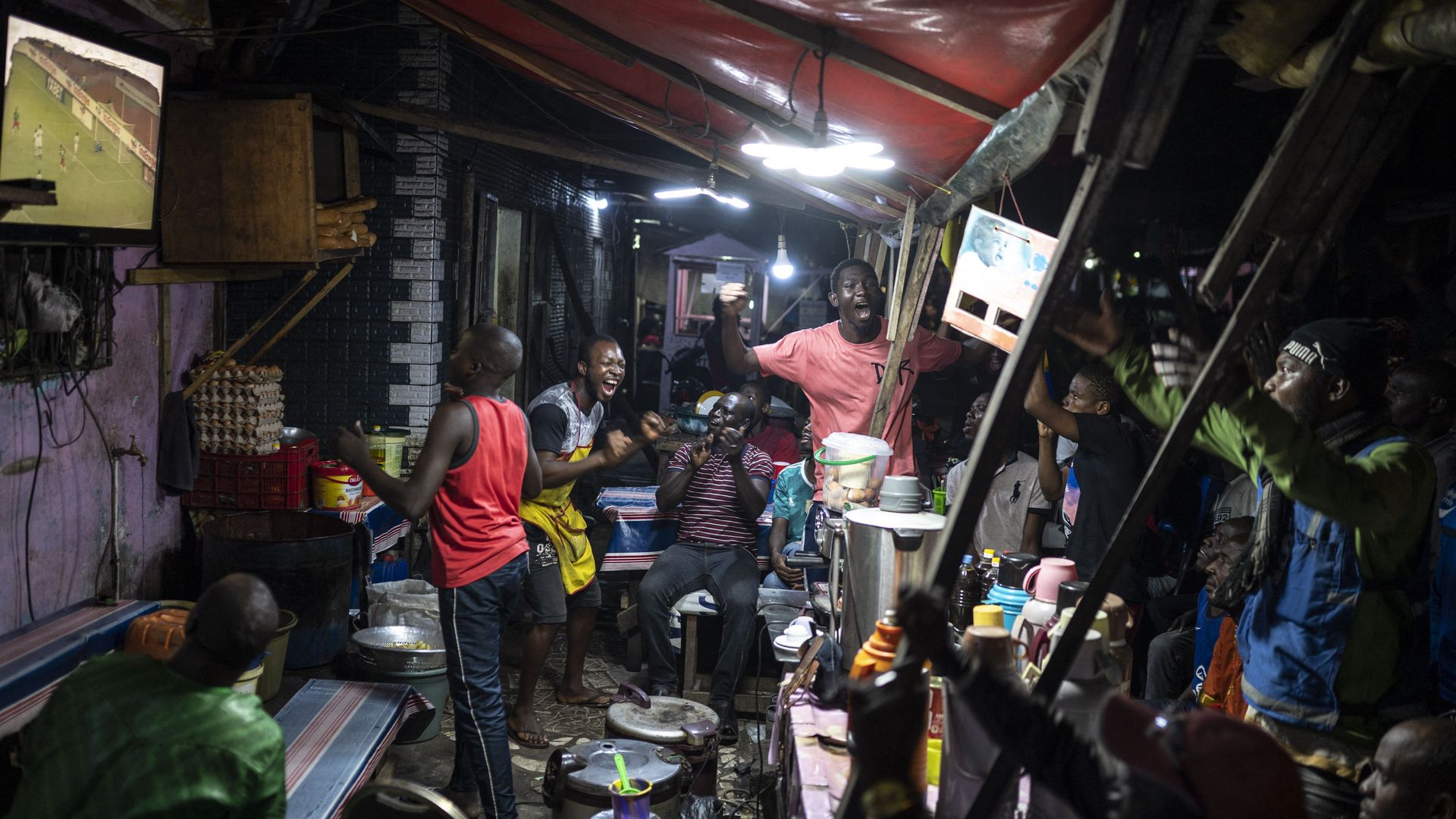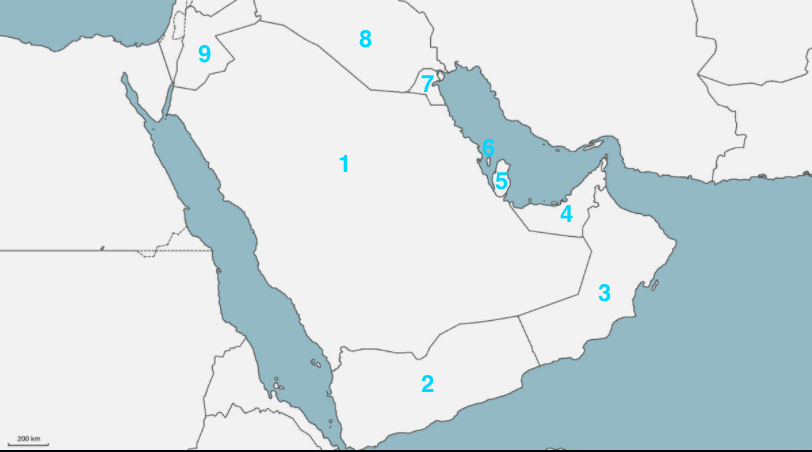| | | | | | | | | | | Axios World | | By Dave Lawler ·Jan 24, 2022 | | Welcome back to Axios World. - In one of the less-prescient editions of this newsletter, in January 2019, I wrote that "coups are becoming a thing of the past." Tonight's edition (1,630 words, 6 minutes) focuses on how they've returned to the present.
| | | | | | 1 big thing: The "year of the coup" continues into 2022 | | Soldiers announce the coup on state TV. Photo: Anadolu Agency via Getty Mutinous soldiers in Burkina Faso declared on state television today that they had deposed the government, closed the borders and taken control of the country. The big picture: This would be the third successful military coup in West Africa in eight months, after juntas took power last year in Guinea and in neighboring Mali, and it's at least the ninth coup attempt globally in the past year. Driving the news: President Roch Marc Christian Kaboré hasn't been seen since an uprising began on Sunday in the capital, Ouagadougou. His whereabouts are unknown, but his party claimed Monday that he had survived an assassination attempt. - Kaboré has struggled to combat an Islamist insurgency since taking power in 2015. Over 1 million people have been displaced by the fighting, and at least 2,000 have been killed.
- Lt. Col. Paul-Henri Sandaogo Damiba signed the televised announcement and is believed to be the coup leader.
- This marks the eighth successful coup in Burkina Faso since 1960, the most in Africa, per the Washington Post.
Zoom in: In the chaotic 24 hours leading up to the announcement, gunfire rang out at military bases and thousands of protesters took to the streets to demand Kaboré's resignation. - The NYT's Declan Walsh reported from Ouagadougou that there was clear popular support for the coup in the streets.
- Walsh described a somewhat surreal scene of jubilant fans watching the national soccer team secure a major victory in the African Cup of Nations, while elsewhere in the city soldiers occupied a military base and police fired tear gas at protesters.
- Rebellious army officers issued a list of demands on Sunday, including more troops to fight the insurgency, new military and intelligence leadership, and better treatment of the families of soldiers who are killed or wounded, British journalist Henry Wilkins reported.
Zoom out: Insecurity has fueled political instability across Africa's Sahel region over the past decade. That has accelerated over the past year. - Mali has seen two coups since 2020, most recently last May. The ruling junta now says it won't hold elections until 2025, sparking stiff sanctions earlier this month from the ECOWAS regional body.
- A coup attempt was foiled last year in Niger. Meanwhile in Chad, President Idriss Déby was killed while commanding a military operation against insurgents. His son, an army general, was installed as his successor.
|     | | | | | | 2. By the numbers: Return of the coup | | There were between zero and two coup attempts globally each year between 2015 and 2020, but that number jumped to a two-decade high of seven in 2021, according to research from Clayton Thyne of the University of Kentucky and Jonathan Powell of the University of Central Florida. - In addition to Chad, Guinea, Mali and Niger, there were two coups in Sudan (one successful and one unsuccessful) and one in Myanmar.
- Coups are now for the most part "limited to the poorest countries in the world" and tend to happen where there are severe security threats or civil wars, as well as a past history of coups, Powell tells Axios.
- While there's clearly a regional dynamic to the recent coup surge, Powell thinks the pandemic has also played a role by straining the resources of vulnerable countries and soaking up the attention of international actors.
 The fact that just one successful coup (in Zimbabwe) took place between 2015 and 2019 may have convinced some would-be plotters they had little chance of success. - A 2015 coup attempt in Burkina Faso collapsed after a week due to domestic pushback and a threat of international intervention.
What to watch: "The lesson being taken from the coups that occurred over the last year is that the international community is ineffectual in dealing with them, and there seems to be increasing evidence that people are more likely to tolerate them domestically," Powell says. |     | | | | | | 3. Catch up quick: The latest from Ukraine |  | | | Ukrainian civilian volunteers receive basic combat training in Kyiv. Photo: Sean Gallup/Getty Images | | | | 8,500 U.S. troops are now on "heightened preparedness" to potentially deploy to Eastern Europe as NATO allies move to shore up the alliance's eastern flank ahead of a potential Russian invasion of Ukraine. Why it matters: NATO has no intention of fighting a war with Russia over Ukraine. But while Vladimir Putin is demanding that NATO pull back from Eastern Europe, the White House is insisting that aggression toward Ukraine will achieve the opposite result. Tale of two allies: - The U.K. is taking a lead role in arming the Ukrainians, largely to convince Putin that he'd face a well-armed foe. The U.K. also issued a surprise warning on Saturday that it had intelligence suggesting the Kremlin plans to install a friendly government in Kyiv. It provided no evidence.
- Meanwhile, Germany is blocking German-made weapons from being transferred to Kyiv and opposing any steps it believes could provoke Putin (though Berlin has offered to fund a field hospital). Some senior German politicians have publicly opposed strong sanctions on Moscow, and the head of the German navy resigned Saturday after saying in part that what Putin really wants is respect, and he probably deserves it.
One reason for the sanctions hesitance in Berlin and other EU countries is natural gas: Russia provides roughly 40% of Europe's supply and 50% of Germany's. - The prospect of a huge spike in energy prices will "break [NATO] unity," Kristine Berzina, of the German Marshall Fund, told my colleagues. The U.S. is seeking to help find alternative sources, including from Qatar.
- President Biden is taking great pains to project, and ideally achieve, unity. He held a video call today with the leaders of France, Germany, Italy, Poland, the U.K., EU and NATO.
- Secretary of State Tony Blinken is also arguing against pre-emptive sanctions on Moscow that, while popular in Kyiv and among Republicans, would break the position coordinated with allies of "massive" repercussions after Putin invades.
What's next: The diplomatic track is still alive. Representatives of the four "Normandy Format" governments — France, Germany, Russia and Ukraine — will meet tomorrow in Paris. |     | | | | | | A message from Axios | | The podcast to power your day. | | |  | | | | Every weekday, host Niala Boodhoo catches you up quick on the latest news and interesting stories you won't hear anywhere else. In 10 minutes, you'll hear the latest in US and world news. Listen now for free. | | | | | | Bonus: Where in the world? | | Today we're taking a trip in and around the Arabian Peninsula. Can you name the nine countries labeled here? Scroll to the bottom for the answers. |     | | | | | | 4. Global news roundup |  | | | Fans in Douala, Cameroon, celebrate a goal in today's match against Comoros. Photo: Charly Tribballeu/AFP via Getty | | | | 1. Ayesha Malik was sworn in today as the first-ever woman on Pakistan's 17-member supreme court. - "Justice Malik, who was educated at the Pakistan College of Law and Harvard University, has served as a high court judge in the city of Lahore in eastern Pakistan for the last two decades," per the BBC.
2. The UAE's Defense Ministry said it "intercepted and destroyed" two ballistic missiles fired Monday by Yemen's Houthi rebels on Abu Dhabi. - Following a previous Houthi attack last week, the Saudi-led coalition ramped up its air raids in Yemen, killing at least 70 people and knocking out the internet in the country, Axios' Laurin-Whitney Gottbrath reports.
- The U.S. and UN have been seeking an end to the fighting in Yemen, which has caused one of the world's worst humanitarian crises.
3. At least six people were killed in a stampede today outside a soccer stadium in Cameroon, where the host country was about to play Comoros for a spot in the quarterfinals of the African Cup of Nations. Authorities have warned that number could rise. - Cameroon won the game, which initially drew attention for the more lighthearted reason that with both of their goalkeepers ruled out due to COVID-19, Comoros was forced to start an outfield player in goal as they attempted to keep their great underdog story alive.
- Tiny Gambia moved on today, defeating Guinea to join Burkina Faso, Tunisia and Cameroon in the quarterfinals with eight other teams still to play tomorrow and Wednesday.
4. The first day of closed-ballot voting for Italy's next president — which requires a supermajority of 1,008 "grand electors" — ended in a stalemate. - Party leaders will now meet privately to seek a consensus candidate. One who would fit the bill is Prime Minister Mario Draghi, but if he switches office, the current coalition government could collapse.
|     | | | | | | 5. Netanyahu's plea talks collapse |  | | | Photo: Emmanudel Dunand/AFP via Getty | | | | Israel's outgoing attorney general has broken off talks aimed at reaching a peace deal before the end of this month with former Prime Minister Benjamin Netanyahu, Axios' Barak Ravid reports. Why it matters: The proposed deal would have kept Netanyahu out of prison but seen him banned from politics for seven years. Netanyahu broke his silence on the plea talks after they collapsed and said he'd never accepted the seven-year ban. - In a video statement, Netanyahu resumed his attacks on the police and prosecution and claimed the case against him was collapsing and should already have been dismissed.
- Netanyahu insisted he'd stay on as leader of the Likud party and of the opposition, heading off an intra-party fight to replace him.
What's next: The plea deal will be frozen for now. The highest-profile case in recent Israeli political history will now pass to the next attorney general, who has yet to be named. - Meanwhile, several key witnesses are expected to appear in court in the coming weeks.
|     | | | | | | 6. An appointment, with history |  | | | Boric and his ministers. Photo: Javier Torres/AFP via Getty | | | | Chile's new president, 35-year-old left-winger Gabriel Boric, selected 14 women and 10 men in a youthful, diverse Cabinet. - In a nod to history, Boric selected Maya Fernández Allende as defense minister — an appointment that comes nearly 50 years after a military junta overthrew her grandfather, former President Salvador Allende.
- The Cabinet includes both progressives and moderates like Mario Marcel, the market-soothing pick for finance minister.
|     | | | | | | 7. Stories we're watching |  | | | Panjshir Valley, Afghanistan. Photo: Mohd Rasfan/AFP via Getty | | | - 39 Chinese warplanes near Taiwan
- China in COVID-19 "emergency mode" before Winter Olympics
- U.S. sanctions Hezbollah "financial facilitators"
- Ex-Pope Benedict admits to false testimony in German sex abuse case
- U.K. PM orders inquiry into Muslim lawmaker's discrimination claim
- Julian Assange allowed to appeal U.S. extradition
- Team USA is 100% vaccinated
Quoted: "I fear for my life." — Mexican journalist Lourdes Maldonado López addressing President Andrés Manuel López Obrador in a 2019 press conference. She was killed on Sunday. |     | | | | | | A message from Axios | | The podcast to power your day. | | |  | | | | Every weekday, host Niala Boodhoo catches you up quick on the latest news and interesting stories you won't hear anywhere else. In 10 minutes, you'll hear the latest in US and world news. Listen now for free. | | | | Answers: 1. Saudi Arabia; 2. Yemen; 3. Oman; 4. United Arab Emirates; 5. Qatar; 6. Bahrain; 7. Kuwait; 8. Iraq; 9. Jordan. |  | Bring the strength of Smart Brevity® to your team — more effective communications, powered by Axios HQ. | | | | | | Axios thanks our partners for supporting our newsletters. If you're interested in advertising, learn more here.
Sponsorship has no influence on editorial content. Axios, 3100 Clarendon Blvd, Suite 1300, Arlington VA 22201 | | | You received this email because you signed up for newsletters from Axios.
Change your preferences or unsubscribe here. | | | Was this email forwarded to you?
Sign up now to get Axios in your inbox. | | | | Follow Axios on social media:    | | | | | |













No comments:
Post a Comment